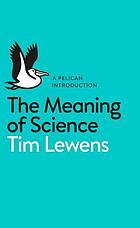
The Meaning of Science
An Introduction to the Philosophy of Science
کتاب های مرتبط
- اطلاعات
- نقد و بررسی
- دیدگاه کاربران
نقد و بررسی

December 21, 2015
Lewens (Cultural Evolution: Conceptual Challenges), a philosopher of science at Cambridge University, asks “a series of questions about the broad significance of scientific work” in this accessible and engaging introductory volume. The book’s first half deals with the nature of science: “how science works,” why and under what conditions it might make sense to trust the findings of science, and how one might differentiate science from nonscience. Lewens explores the ideas of Karl Popper and Thomas Kuhn, bringing clarity to the work of both, and uses the examples of economics, homeopathy, and intelligent design to seek the point of demarcation between scientific and nonscientific ideas. He concludes with the somewhat unsettling position that there is no single characteristic that will permit the two to be distinguished. In the book’s second half, Lewens examines a range of current controversies in an attempt to demonstrate how science confronts complex ideas and is unable to disentangle itself from deep philosophical issues. Lewens concludes by placing science in a broader human context: “Although science tells us much that is important, there is no chance that it will ever tell us all that we need to know if we are to understand our world, to live well, and to make wise decisions.”

November 15, 2015
What is science? In this sporadically interesting primer, Lewens (Philosophy of Science/Cambridge Univ.; Cultural Evolution: Conceptual Challenges, 2015, etc.) mostly answers by saying what science isn't."What is the meaning of science? This is not a question that science will answer on its own." Look closely at the formulation as Wittgenstein might, and you have a justification for why philosophers of science should draw a paycheck--after all, the scientists can't tell you what it all means, and someone has to. That's all to the good, but some of what Lewens explores isn't really the province of science. The ancient question of whether humans possess free will is not one that science as such bothers with, though it has some bearing on cognitive research. The author's answer is characteristically hedged. "Neuroscience," he writes, "has not yet shown freedom to be an illusion." Not yet, but come the singularity, watch out. The issue of what constitutes an appropriate problem for science is material, for, as Lewens notes toward the end of the book, there is much debate among philosophers of science--less among scientists, of course--whether "the facts revealed by chemistry, biology, and psychology are all, in some fundamental sense, facts of physics." To his credit, on the matter of domains of inquiry, the author notes that science can generally do without theories of "human nature," which again fall to the social sciences and, yes, philosophy. At its best, the book raises provocative questions, but all too often, those questions are--well, in the form of questions, too many piled atop one another: "What do we mean when we say that a theory is simple? Do we mean it is easy to work with? Do we mean it asserts the existence of very few new theoretical entities?" The constant grilling is an annoying professorial tic, and one wishes for less of it. Readers seeking a more humane, more direct orientation would do well to dust off Jacob Bronowski's The Ascent of Man (1974), dated but still valuable.
COPYRIGHT(2015) Kirkus Reviews, ALL RIGHTS RESERVED.

























دیدگاه کاربران